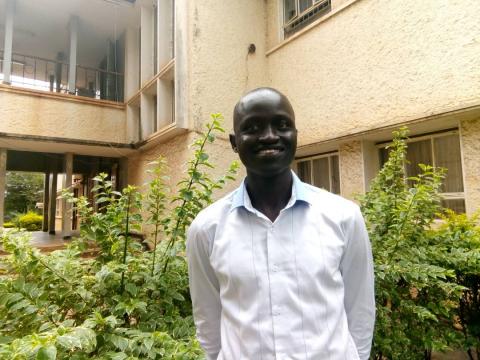No Mentors for Young South Sudan Journalists
 Submitted by jbimokola on
Submitted by jbimokola on

Full multimedia storyhttps://shamimbataliwo.wordpress.com/2018/06/22/no-mentors-for-young-sou...
There is a future of uncertainty for young budding journalists who would like to tell the South Sudanese story through media. This fear comes at a time when the world’s youngest nation is at the forefront abusing media freedoms for any journalist that dares criticize the government in power.
After completing his four-year journalism degree course at Makerere University, one would expect Mawel Chol Mawel to return home and contribute to the building of the young and war-torn nation. But the 23-year-old is not sure at lays ahead as his journey into professional journalism begins.
“The future is doomed as long as the current government of President Salvar Kiir is still in power,” says Mawel.
Dressed in navy blue pants and a white long sleeved shirt, he stands tall outside the quadrangle of the College Humanities and Social Sciences. His thin smile hides the real story of worry, fear of the unknown and determination to face the odds.
In 2015, President Salvar Kiir vowed to kill any journalist who dared “work against his government”.
“I vividly remember him saying that while flying out of South Sudan for a foreign trip and that very day in the evening one radio journalist was killed by his officers,” says Mawel.
But this graduate from Makerere University says this act did not deter him from pursing the course of his dreams, a Degree of Journalism and Communication. He says killing of this radio journalist just gave him strength to push forward with his dream of becoming a journalist in South Sudan.
“I am going back and practice journalism and change effect. All you have to know is that you have to sacrifice for others to be well”.
Mawel will be one of a few brave journalists in South Sudan to practice his profession amidst the tide. A brutal civil war has brought the country to its knees with at least four million of its 11 million people displaced from their homes. Of those displaced, according to the United Nations refugee agency--UNHCR, at least three million are living in displaced people’s camps in neighbouring countries, including Uganda, where Mawel has received his education.
Just like many other aspiring journalists from South Sudan, Mawel is calling upon civil society organizations to put pressure on the current government to change some of the media policies for them to work without fear of being persecuted.
"Media organizations even other foreign agencies should engage Kiir’s government to ensure that journalists’ rights are respected,” says Mawel.
Dominic Kango, a journalist and media researcher based in Uganda, says several journalists have gone into exile or have stayed and have decided to publish their stories under proxy.
“Some South Sudanese journalists have decided not to put their names on the byline. Others have run to neighbouring countries such as Uganda and Kenya, but still they use other identities.”
For fear of being persecuted, another South Sudan student who prefers anonymity says he will prefer working with civil or humanitarian organizations as a communication officer. He says this will enable him work smoothly without rubbing government the wrong way.
“Even though I have studied Journalism and communication I am only going to be a communications specialist. I work for other agencies than being mainstream news journalist,” he says.
A United Nations report released early this year highlights censorship of the media and restriction of freedom of expression which continues to date. The report dubbed “Right to Freedom of Opinion and Expression in South Sudan”, documented 99 cases of rights abuses and 60 incidents in which the rights to freedom of expression of 102 victims were violated.
An official working for the South Sudan embassy in Kampala, Uganda who preferred anonymity, says such crimes against media freedom can only be reversed if the current political turmoil ends.
“Both government and the rebels do not want to be criticized and you have seen journalists either being killed or go abroad. Not until the current war ends there will be no conducive environment for any journalist to operate”.
A civil war broke out in December 2013 between forces loyal to President Kiir and those supporting his former vice president, Dr Riek Machar. Because of the violence which has taken a tribal dimension, people living outside the capital Juba do not have access to information even lack the freedom to expression.
An Interim Assessment of the media development in South Sudan by UNESCO indicates that people living in rural areas of South Sudan have limited access to media such as radio since very few people can afford it. This is coupled with lack of reliable and affordable communication devices and services.
A journalist working with one of the radio stations in the capital, Juba, says: “At the moment Juba is the only known place with peace other areas are not safe for journalists to carry out their work. Even potential media investors cannot set up infrastructure in war torn areas.”
The Ministry of Telecommunication and Postal Services has in the pledged to improve access to reliable and affordable communication devices and services.
But the journalist punches holes in the proposal: “That is propaganda by political players in South Sudan. Actually it is not any issue they are focused on doing in the near future.”
- Log in to post comments
- 779 reads
